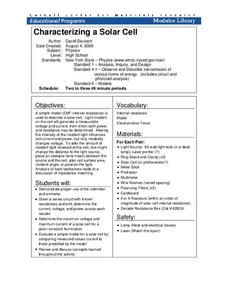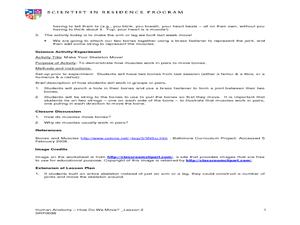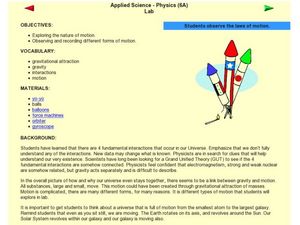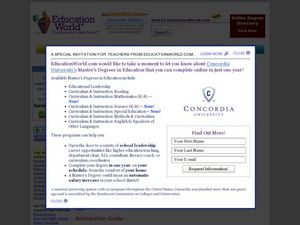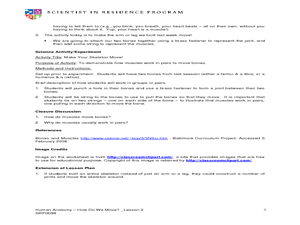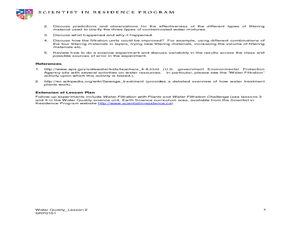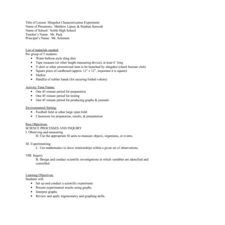Polar Trec
Arctic Smorgasbord!
Two blooms of phytoplankton, instead of just one, now occur in the Arctic due to declining sea ice, which will have widespread effects on the marine life and climate. In small groups, participants build an Arctic food web with given...
Agriculture in the Classroom
Roll of the Genes
Animal reproduction in sheep and cattle is explored with the help of Punnet squares. Scholars employ tools using probability to conclude the color of wool a sheep's offspring will have. Acting as animal geneticists, pupils then take...
NASA
Christa's Lost Lesson: Effervescence
How are chemical reactions affected by gravity? Learners explore the phenomenon of effervescence as part of the Christa's Lost Lessons series. They compare findings in an experiment on effervescence to a video of a similar experiment in...
Curated OER
Life in the Crystal Palace
Marine biologists research sea ice communities. Assign some groups to construct paper models of sea ice communities in winter, and some to construct models of them in summer. The activity is simplistic, but the Internet resources...
Cornell University
Diffraction Demystified
Study diffraction patterns using CDs and DVDs! Scholars measure the diffraction patterns of a light wave as it hits a CD or DVD. Using the information, they can measure the distance between the tracks.
Cornell University
Characterizing a Solar Cell
Young classes are sure to get a charge out of this lesson! Learners experiment with circuits of a solar cell. They practice determining current, voltage, and power for the circuit and maximize the voltage and current of the cell.
Curated OER
Volcanoes A-Z
Students examine terminology related to the study of volcanoes, geology, or the ecosystems that surround them. They make note of key words while reading exhibits, interpretive signs, or labels, or hearing them from each other, their...
Curated OER
Bones
Fifth graders observe real bones and models to learn about the structure and function of the skeletal system. In this skeletal system lesson, 5th graders manipulate objects and models of bones. They handle real bones and determine the...
Curated OER
Sometimes, solid + liquid = gas
Third graders experiment with common household liquids and solids. In this chemical reaction lesson plan, 3rd graders discuss phase changes and experiment to find other ways to create gases. They use water, vinegar, lemon juice, flour,...
Curated OER
Flying Too Close to the Sun
Young scholars research the myth of Icarus and his father and discuss the associated metaphor. They view the work of a number of artists and create a painting depicting the myth.
Curated OER
Structure-Property Relationships
Students explore the structure and property changes of water through videos and classroom discussion. They are introduced to atomic arrangement of solids by looking closely at carbon in different forms, such as graphite and diamond....
Curated OER
Describing Nests
Students observe bird nests. For this observation level, students explore bird nests using their five senses. Students compare and contrast bird nests while hypothesizing about the need birds have to construct the nest.
Curated OER
Human Anatomy - How Do We Move?
Fifth graders discover how blood moves around the body. In this circulatory system lesson, 5th graders feel their pulse before and after exercise. Students count their heart rate. Students use the scientific method to record...
Curated OER
The Skeletal System
Young scholars research the skeletal system. In this anatomy lesson, students measure their bodies to find the approximate length of their bones. They draw and cut out each of the bones and then attach them using brads or glue.
Curated OER
Human Anatomy- How Do We Move?
Students examine the muscular system. In this muscular system instructional activity, students first draw a realistic representation of their leg or arm bones. Students do several activities to attach these bones to "joints" with...
Curated OER
Air Engine - Air Races
Students conduct an experiment about air volume, density, and pressure. In this air lesson, students discuss air, and how it moves. They make predictions about what will happen during the balloon and string experiment. They document the...
Curated OER
Motion Experiment
Students experiment with the laws of motion. In this motion instructional activity, students explore Newton's Laws of Motion. Students work in groups experimenting with different objects and observing different types of motion.
Curated OER
New Year Celebrations Around the World
Students share their New Year's traditions, then read a news article about how people around the world celebrate the start of a new year. In this current events lesson, the teacher introduces the article with a discussion and vocabulary...
Curated OER
Human Anatomy- How Do We Move?
Learners explore the human anatomy. In this respiratory system lesson, students conduct an experiment to simulate the capacity of human lungs.
Curated OER
Human Anatomy -- How Do We Move?
Students create a model of the digestive system. In this human anatomy instructional activity the students examine features of the digestive system. The students perform an experiment.
Curated OER
Water Quality: Water Filtration
Students build a water filtration system. In this water quality lesson plan, students work in groups to construct water filtration units that can purify contaminated water. This lesson plan is part of a larger unit on water quality.
Curated OER
Introduction to Work
Fifth graders define work, force, and energy and calculate work done using a simple formula. They observe the teacher using an Equi-beam and identify the fulcrum, calculate different work problems, and participate in a class discussion.
Curated OER
Slingshot Characterization Experiment
Students set up and conduct a scientific experiment to demonstrate data collection. In this scientific process lesson, students complete an activity with the specific objective of using a slingshot to fire a t-shirt into the crowd at a...
Curated OER
Simple Machines
Fourth graders discover the principles and uses of gears noting that they can be used to change the direction of motion or the speed of an object. They may also change the force and/or distance through which an object turns. They then...





